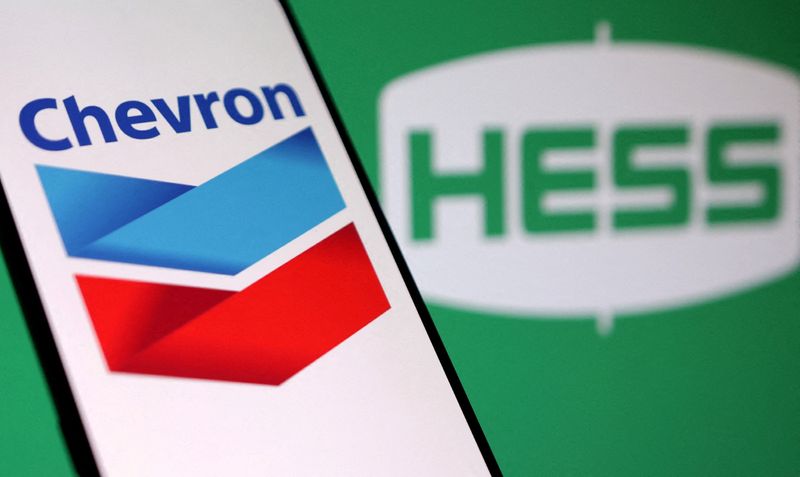By Sabrina Valle
HOUSTON (Reuters) – Hessen Corp (NYSE:) CEO John Hess has until Tuesday to quell a shareholder revolt over his handling of what could prove to be one of the biggest mergers in oil industry history: a proposed sale of the oil producer worth $53 billion Chevron Corp. (NYSE:)
Hess, 70, has visited or called dozens of investors in the past month to drum up support. The sale seemed all but certain last fall, and Hess still appears poised to win, based on Reuters’ interviews with major investors. But support has waned in recent weeks as more investment funds expressed concerns about the deal.
A protracted US federal regulatory review and a surprise arbitration challenge ExxonMobil (NYSE:) have put about 40% of the outstanding shares at risk, according to interviews.
That could make it harder for Hess to get more than 50% of the 308 million outstanding shares approved, even though he can count on his family shares, along with other directors and management, for about 10%.
Hess has lost about $5 billion in market value since announcing the deal. Every quarter as the merger is postponed, shareholders lose the chance to receive a dividend payment from Chevron – a major incentive because Chevron’s dividend is four times larger than Hess’s payout.
“This is the mother of all shames,” said a London-based investor who declined to be named, adding that if Hess shareholders approve this deal, the chances of a higher bid will fade.
TIGHT SCOREBOARD
Three companies – HBK Capital Management, DE Shaw & Co and Pentwater Capital Management – have stated that they are not ready to give their consent. Together they own almost 6% of Hess.
Another three investors filed lawsuits to delay or block the vote, backed by a flurry of letters to Hess management complaining that it had failed to disclose legal and regulatory issues that could delay the transaction by as much as a year to delay.
Six major investors who spoke to Reuters on condition of anonymity estimate that companies owning about 40% of the company’s shares have decided or are strongly considering abstaining, which essentially means a no- voice.
“The longer this goes on, the more I would question the value proposition of this merger,” said Roy Behren, co-president of Westchester Capital Management, which owns $317 million in Hess stock and is considering an abstention.
The delays have dented expected profits for arbitrage funds that piled into Hess stock after the deal was announced, betting it would close in the first quarter.
Fayez Sarofim & Co, Invesco and Barrow Hanley, which hold about 3% of the outstanding shares worth about $1.5 billion, are expected to vote yes, according to people familiar with the matter. The three companies declined requests for comment.
Influential proxy advisor Institutional Shareholder Services (ISS) has recommended abstention to allow more time before details of the arbitration case emerge. Rival Glass Lewis recommended voting in favor, saying the benefits of the Chevron deal are sound and offer Hess shareholders a premium.
Top investment company Vanguard Group has the largest individual stake with 10% of Hess shares. Votes of the portfolio managers can influence the outcome. Vanguard declined to reveal its vote.
EXXON AS POSSIBLE SPOILER
This year, Exxon and partner CNOOC (NYSE:) Ltd filed an arbitration case claiming they had a first right of refusal to purchase Hess’ assets in Guyana. Chevron and Hess say a right of refusal does not apply to the sale of the entire company. If Exxon’s arbitration is successful, Chevron can walk away from the deal without paying a breakup fee.
In recent private meetings, John Hess told investors he was unaware of Exxon’s endgame with the arbitration. If Exxon succeeds, Hess and Chevron said they would call off the deal, and Hess said this would mean Exxon would not be able to exercise its right of first refusal on Guyana’s assets.
If the arbitration succeeds and Chevron walks away, Hess would have few alternative buyers given its preemption on any future deal, said Biraj Borkhataria, an energy analyst at researcher RBC Capital Markets.
Chevron desperately needs the deal to keep pace with rival Exxon, which this month completed its $60 billion takeover of the shale producer Natural resources pioneer (NYSE:).
The lucrative Guyana oil fields from Hess would help Chevron hedge geopolitical risks associated with the TengizChevroil project in Kazakhstan, which transports most of its oil through Russia to a Black Sea port. It would also help balance overruns at Chevron’s Australian LNG projects (which have been hit by labor and operational issues).
A spokesperson said Chevron “looks forward to Hess receiving a successful shareholder vote and consummating the transaction under the terms of our merger agreement.” Last month, CEO Michael Wirth said Chevron would be in good shape regardless of the acquisition.
Some Hess shareholders are questioning whether Exxon would make a higher offer for Guyana’s assets than what they would get from Chevron’s bid for the company. There are no legal barriers to an Exxon bid before Tuesday, but Exxon has said it wants its rights to the assets in Guyana confirmed before any decision on a bid is made.

Exxon has also said it will not attempt to acquire Hess as a whole.
“I don’t see how Exxon can bid (for Hess) when they said they wouldn’t,” said oil analyst Paul Sankey of the Sankey Research firm. “Unless they wait a while and things change a lot. I mean years.”


